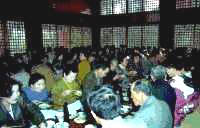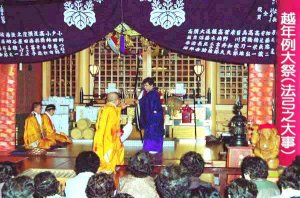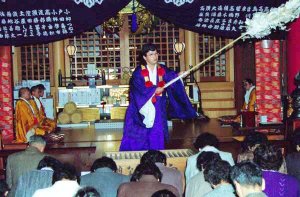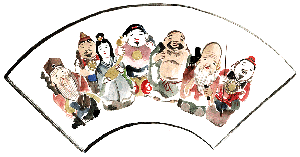
@English version p` about Daikoku-sama

 Why are people entertained by Mochi (rice cake) at Daikoku's grand festival?
Why are people entertained by Mochi (rice cake) at Daikoku's grand festival?
 A long time ago, when Kobo Daishi (Kobo the great teacher) had a statue of Kinoene (mouse) Daikokuten (the god of wealth) built, he said to the people on the occasion of the statue's consecration "people pray for prosperity, offering mochi made of millions of rice grains, scatter mochi to celebrate good harvests and eat the mochi to store energy for more good work." He told them that by eating mochi offered to Daikokuten, people would be given stronger En (luck) as well as Fukujyuroku. Fuku represents great generosity of spirit while Roku represents material abundance, and Jyu is the health. If you are given Fukurokujyu, it is believed that you and your family members can live each day, smiling just like Daikokuten, with his protection.
A long time ago, when Kobo Daishi (Kobo the great teacher) had a statue of Kinoene (mouse) Daikokuten (the god of wealth) built, he said to the people on the occasion of the statue's consecration "people pray for prosperity, offering mochi made of millions of rice grains, scatter mochi to celebrate good harvests and eat the mochi to store energy for more good work." He told them that by eating mochi offered to Daikokuten, people would be given stronger En (luck) as well as Fukujyuroku. Fuku represents great generosity of spirit while Roku represents material abundance, and Jyu is the health. If you are given Fukurokujyu, it is believed that you and your family members can live each day, smiling just like Daikokuten, with his protection.
Moreover, mochi itself is a symbol of good luck and the grand festival somehow has a harvest festive atmosphere. Mochi plays a very important role in the grand festival.
 Originally, at Naorai (feast with food and drinks offered to god), people ate and drank with god in his house. As the years passed, Naorai started to change from its original path and now more people have Naorai without god. We believe Fukumochi (good luck mochi) brings good luck when it's eaten with Daikokuten in his house. We therefore follow the traditional style.
Originally, at Naorai (feast with food and drinks offered to god), people ate and drank with god in his house. As the years passed, Naorai started to change from its original path and now more people have Naorai without god. We believe Fukumochi (good luck mochi) brings good luck when it's eaten with Daikokuten in his house. We therefore follow the traditional style.
Especially since there is a recession at this moment, we would like many people to eat Fukumochi to dispell bad luck.
A group of 20 people or more can call us to make a reservation for the Fukumochi meal set which is served in the same style as at the grand festival.
 *The year of the Rabbit is deeply related to Daikokuten. Come visit the temple on this occasion.
Kinoene Daikokuten Annual Grand Festival is held on November 19th every year. Special prayer by Yamabushi (itinerant Buddhist monks) will be offered at 10:00 am and noon.
*The year of the Rabbit is deeply related to Daikokuten. Come visit the temple on this occasion.
Kinoene Daikokuten Annual Grand Festival is held on November 19th every year. Special prayer by Yamabushi (itinerant Buddhist monks) will be offered at 10:00 am and noon.
The prayer with holy ax, treasure sword and bow from ancient times as well as the prayer of purifying the whole world is believed to bring happiness to each family so that everybody can live each day smiling like Daikokuten.
We also have Fukukuji (good luck drawing of lots) and winners can receive Okasanemochi (layered mochi) or a picture of the Seven Gods of Good Fortune. Special mochi will be served to those who apply for Kiroku. We have a lot of visitors from all over Japan.
About Daikokuten
@Daikokuten is the ancient Indian god called gMahakalag in Sanskrit,
who took charge of battles, destruction and the like. In esoteric Buddhism,@
it is considered to be gMakesvarag incarnate that is the guardian god.
In Japan, Daikokuten has been one of the Sichihukujin-seven gods that bring us good luck.
Also in Shintoism, which is the indigenous religion of Japan, Daikokuten has been
the Japanese godg Ohkuninusig together and has been enshrined.
This genealogy brought the factors of esoteric Buddhism and ascetic Buddhism to the faith
in Daikokuten. People imagine that Daikokuten has a small mallet in his right hand,
carries a large sack on his left shoulder, and wears a hood. He is usuallyseen treading
on a straw bag and he is usually laughing.
In present day Japan, We can still see figures of Daikokuten.
People imagine that Daikokuten has a small mallet in his right hand,
carries a large sack on his left shoulder, and wears a hood. He is usuallyseen treading
on a straw bag and he is usually laughing.
In present day Japan, We can still see figures of Daikokuten.
Is Daikoku-sama god ?
Daikoku-sama(meaning Mr,Daikoku)
was brought to Japan as "Daikokuten". Daikokuten is the gardian of Buddha and Dharma
in Buddhism. In the past people gradually began to enshrine the gods of Buddism and
the gods of Shintoism together. According with this custom, people enshrined
"Daikokuten" and "Ohkuninusi"(a Shinto god) together as the Chinese-stylereading
of the character "oh-kuni" is "dai-koku".
During the Meiji period(modern age), Dajokan(the Great Council of State)
provided that Buddha and a Shinto god could not be enshrined together and
Shintoism was regarded as the national religion. For this reason, people must
enshrine Daikokuten separately from Ohkuninusi. But, faith cannot be restricted by law,
so in this place we have enshrined Daikoku-sama as "kinoene-Daikokuten" in the old style.
"Kinoe-Ne" is the Japanese-style name of the day, or year. It has its origins in China.
"Kino-e" means wood and yang. The former is considered as one of the five great
phenomenon in the creation of the world, and the latter which means to
take charge of half of the world, is one of the "Jyukkan".
"Ne" is one of the twelve zodiac signs meaning "rat". We have enshrined Daikokuten
in theyear of "kinoe-Ne".
So we can revere "Kinoene-Daikokuten" as a god, the gardian of Buddha.
We usually pray to him by clapping our hands, but we pray by putting our
hands together during times of mourning.
@
@@
Can Daikoku-sama really bring us good luck by swinging his small mallet?
In Japan, people imagine that Daikoku-sama has a small mallet in his hand.
It is also thought that he carries a large sack over his shoulder.
Many children often ask if it is really true that he can bring us many
''koban'(oval gold coins formerly used in Japan) by swinging his mallet.
When asked this question we should think of the indian 'Daikokuten', the Guardian of Buddha.
The indian Daikokuten is the original incarnation of the Japanese Daikoku-sama and
Daikokuten is known to carry various tools in his many hands.
Daikoku-sama's mallet could be thought to be the same as the many tools
in the hands of Daikokuten. We use tools to work with nature and to help
make products. Tools are of no use unless we use them. If we have no will to work on anything,
it is not important how many or what tools we possess.
The fact that Daikoku-sama swings his small mallet shows that he works using any tools he can.
If we make a wish or a vow to Daikoku-sama and he hears it, we know he will swing
his small mallet and brings us koban as 'good luck'. When he does this he does not draw
'good luck' from thin air but he gives us an example by working on something.
We should learn our true faith from this behavior of Daikoku-sama.
We need to make an effort,to think, to realise that working by ourselves is important,
not just praying in hope to god. Heaven helps those who help themselves.
Why is the Daikoku Sama perched on a straw rice bag?
 This is a question that is often asked. The straw rice bag is something that stands for
more than just food, but rather economic power. In old times, the phrase
"The 10000 Bushels" similarly stood for the economic prowess of the Daimyo (feudal lord).
When you stop to think about it, humans can't live without eating. Even of one wants to
do some work, nothing is realized if there's no kind of procession. As well, even if
you want to somehow help a person who's in need, if you have no leeway or room to move
yourself then that too (helping someone) can't be done. Rather, when you think about
that in itself, it is evidence or proof of one having leeway in the heart, or havean open
heart. I think that kindness, in many cases, comes from one havingeconomic leeway. However
it's no good if one becomes a miser.
This is a question that is often asked. The straw rice bag is something that stands for
more than just food, but rather economic power. In old times, the phrase
"The 10000 Bushels" similarly stood for the economic prowess of the Daimyo (feudal lord).
When you stop to think about it, humans can't live without eating. Even of one wants to
do some work, nothing is realized if there's no kind of procession. As well, even if
you want to somehow help a person who's in need, if you have no leeway or room to move
yourself then that too (helping someone) can't be done. Rather, when you think about
that in itself, it is evidence or proof of one having leeway in the heart, or havean open
heart. I think that kindness, in many cases, comes from one havingeconomic leeway. However
it's no good if one becomes a miser.
I guess after all it's a fact of life that we live in an era where it's necessary in
the world to have a precedent or something to go on. Basing that (the straw rice bag)
as the foundation, are human beings who show their appreciation to this. If one doesn't
take care of even only one grain of rice, that foundation will gradually crumble or collapse.
The thing that teaches us that concept is Daikoku Sama's straw rice bag.
What is Sichihukujin ?
In Japan, seven gods that bring us Good fortune have been enshrined as the Sichihukujin.
They are "Ebisu","Daikokuten","Bishamonten","Benzaiten", "Hoteison","Fukurokujyu",
and "Juroujin".It is thought that the faith of Sichihukujin began in the Heian period
(ancient age). It became very popular during the Edo period(pre-modern age).
The Sichihukujin were worshiped by Tenkai who was the brains behind Ieyasu Tokugawa-Shogun,who
was the Load of the Japanese realm at the beginning of the Edo period.
Tenkai believed that the seven Deities of Sichihukujin bring good fortune through deep faith.
Each god has each origin and brings us different virtues. Ebisu, who is an original Japanese
god, brings us "Trust". Fukurokujyu and Jyuroujin aregods of Taoism. The former brings us
"Popularity",the latter brings us "Health". Hoteison existed as a priest of the Zen sect
in China who was deified. He brings us "Integrity".The others are originally ancient
Indian gods. Benzaiten("Sarasvati" in Sanskrit) brings us "Charm".Bishamonten("Vaisravana")
who is the guardian of Buddha and Dharma in Buddhism,
brings us "Power". Daikokuten("Mahakala") brings us "Good luck".The true faith of Sichihukujin
is to achieve all of these virtues and therefore be truly happy. We cannot achieve this true happiness by sleeping beside a picture of theSichihukujin alone.
It is necessary to pray, in order to receive a sprouting of these virtues so we can nurse them.
It is central to the faith of Sichihukujin, that the seven virturs grow up in our heart.
We cannot wait for that happiness to come by its self.
We cannot achieve this true happiness by sleeping beside a picture of theSichihukujin alone.
It is necessary to pray, in order to receive a sprouting of these virtues so we can nurse them.
It is central to the faith of Sichihukujin, that the seven virturs grow up in our heart.
We cannot wait for that happiness to come by its self.
 English version No.2
English version No.2
 Title
Title



 Why are people entertained by Mochi (rice cake) at Daikoku's grand festival?
Why are people entertained by Mochi (rice cake) at Daikoku's grand festival? A long time ago, when Kobo Daishi (Kobo the great teacher) had a statue of Kinoene (mouse) Daikokuten (the god of wealth) built, he said to the people on the occasion of the statue's consecration "people pray for prosperity, offering mochi made of millions of rice grains, scatter mochi to celebrate good harvests and eat the mochi to store energy for more good work." He told them that by eating mochi offered to Daikokuten, people would be given stronger En (luck) as well as Fukujyuroku. Fuku represents great generosity of spirit while Roku represents material abundance, and Jyu is the health. If you are given Fukurokujyu, it is believed that you and your family members can live each day, smiling just like Daikokuten, with his protection.
A long time ago, when Kobo Daishi (Kobo the great teacher) had a statue of Kinoene (mouse) Daikokuten (the god of wealth) built, he said to the people on the occasion of the statue's consecration "people pray for prosperity, offering mochi made of millions of rice grains, scatter mochi to celebrate good harvests and eat the mochi to store energy for more good work." He told them that by eating mochi offered to Daikokuten, people would be given stronger En (luck) as well as Fukujyuroku. Fuku represents great generosity of spirit while Roku represents material abundance, and Jyu is the health. If you are given Fukurokujyu, it is believed that you and your family members can live each day, smiling just like Daikokuten, with his protection. Originally, at Naorai (feast with food and drinks offered to god), people ate and drank with god in his house. As the years passed, Naorai started to change from its original path and now more people have Naorai without god. We believe Fukumochi (good luck mochi) brings good luck when it's eaten with Daikokuten in his house. We therefore follow the traditional style.
Originally, at Naorai (feast with food and drinks offered to god), people ate and drank with god in his house. As the years passed, Naorai started to change from its original path and now more people have Naorai without god. We believe Fukumochi (good luck mochi) brings good luck when it's eaten with Daikokuten in his house. We therefore follow the traditional style. *The year of the Rabbit is deeply related to Daikokuten. Come visit the temple on this occasion.
Kinoene Daikokuten Annual Grand Festival is held on November 19th every year. Special prayer by Yamabushi (itinerant Buddhist monks) will be offered at 10:00 am and noon.
*The year of the Rabbit is deeply related to Daikokuten. Come visit the temple on this occasion.
Kinoene Daikokuten Annual Grand Festival is held on November 19th every year. Special prayer by Yamabushi (itinerant Buddhist monks) will be offered at 10:00 am and noon. People imagine that Daikokuten has a small mallet in his right hand,
carries a large sack on his left shoulder, and wears a hood. He is usuallyseen treading
on a straw bag and he is usually laughing.
In present day Japan, We can still see figures of Daikokuten.
People imagine that Daikokuten has a small mallet in his right hand,
carries a large sack on his left shoulder, and wears a hood. He is usuallyseen treading
on a straw bag and he is usually laughing.
In present day Japan, We can still see figures of Daikokuten.
 This is a question that is often asked. The straw rice bag is something that stands for
more than just food, but rather economic power. In old times, the phrase
"The 10000 Bushels" similarly stood for the economic prowess of the Daimyo (feudal lord).
When you stop to think about it, humans can't live without eating. Even of one wants to
do some work, nothing is realized if there's no kind of procession. As well, even if
you want to somehow help a person who's in need, if you have no leeway or room to move
yourself then that too (helping someone) can't be done. Rather, when you think about
that in itself, it is evidence or proof of one having leeway in the heart, or havean open
heart. I think that kindness, in many cases, comes from one havingeconomic leeway. However
it's no good if one becomes a miser.
This is a question that is often asked. The straw rice bag is something that stands for
more than just food, but rather economic power. In old times, the phrase
"The 10000 Bushels" similarly stood for the economic prowess of the Daimyo (feudal lord).
When you stop to think about it, humans can't live without eating. Even of one wants to
do some work, nothing is realized if there's no kind of procession. As well, even if
you want to somehow help a person who's in need, if you have no leeway or room to move
yourself then that too (helping someone) can't be done. Rather, when you think about
that in itself, it is evidence or proof of one having leeway in the heart, or havean open
heart. I think that kindness, in many cases, comes from one havingeconomic leeway. However
it's no good if one becomes a miser. We cannot achieve this true happiness by sleeping beside a picture of theSichihukujin alone.
It is necessary to pray, in order to receive a sprouting of these virtues so we can nurse them.
It is central to the faith of Sichihukujin, that the seven virturs grow up in our heart.
We cannot wait for that happiness to come by its self.
We cannot achieve this true happiness by sleeping beside a picture of theSichihukujin alone.
It is necessary to pray, in order to receive a sprouting of these virtues so we can nurse them.
It is central to the faith of Sichihukujin, that the seven virturs grow up in our heart.
We cannot wait for that happiness to come by its self.
 English version No.2
English version No.2 Title
Title